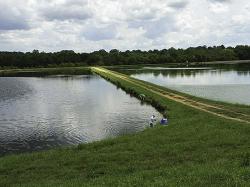Advancing Aquaculture To Meet Growing Demand
January 8, 2018 | 1 min to read

Half the seafood that U.S. consumers eat comes from aquaculture—the raising and harvesting of freshwater and marine species in controlled conditions. Over 90 percent of that seafood is imported, creating a U.S. trade deficit of more than $14 billion.
The Agricultural Research Service (ARS) and its partners are working to close that gap on several research fronts. One such area is the development of cost-effective feeds that will help the U.S. aquaculture industry expand and capture a greater share of the world market for fishery products.
Toward that end, ARS researchers are exploring plant-based alternatives to fishmeal and fish oil. These two aquafeed ingredients are made from so-called forage fish caught in the open ocean, like menhaden, herring, mackerel, anchovy, and sardine. Fishmeal and oil are rich sources of amino acids, lipids, and other nutrients that farm-raised species need to grow—especially carnivorous ones like Atlantic salmon, striped bass, and rainbow trout.
To read the rest of the story, please go to: AgResearch Magazine
